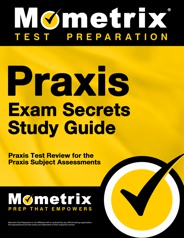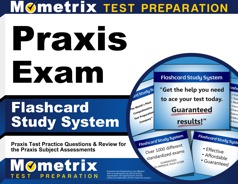Praxis tests are required for teacher certification by 46 states, the District of Columbia, some US territories, and some national organizations. A teacher who passes one is officially recognized by the state as highly qualified to lead a classroom in that subject.
What is Praxis?
The Praxis exams provide a pathway to teacher licensure, measure a teacher’s development, and prove a candidate’s readiness.
These exams were created by and are currently administered by the Educational Testing Service (ETS). ETS was formed in 1947 to provide testing for K-12 and higher education institutions. Additionally, ETS is charged with pursuing research initiatives to advance educational measurement and education.
Passing a teacher certification exam is an essential requirement in every state. Most colleges and universities require an assessment in one form or another for acceptance into a teacher preparation program. As such, part of ETS’ initiative is to provide reliable, fair, and research-based assessments for teacher candidates and current educators using the Praxis series of exams.
The Praxis series of exams include Praxis Core Academic Skills for Educators Tests and Praxis Subject Assessments.
Praxis Study Guide
Mometrix Academy is a completely free resource provided by Mometrix Test Preparation. If you find benefit from our efforts here, check out our premium Praxis study guide to take your studying to the next level. Just click the Praxis study guide link below. Your purchase also helps us make even more great, free content for test-takers.
Check Out Mometrix's Praxis Study Guide
Get practice questions, video tutorials, and detailed study lessons
Get Your Study Guide
Praxis Core Academic Skills for Educators
In 2014, the Praxis I was replaced with the Praxis Core Academic Skills for Educators (Praxis Core), covering similar topics as Praxis I. This exam is a basic test of your reading, writing, and mathematical skills. Colleges, universities, and other training programs may use the Core test to evaluate your potential in a teacher-educator program.
There are three subtests within the Core exam: Reading, Mathematics, and Writing. Each subtest is computer-delivered at a Praxis testing center or by a live remote proctor at the test taker’s home or office. You can take the Core tests individually or in one appointment.
Select a Core test below to see more details.
Praxis Subject Assessments
There are over 90 subject tests in the Praxis catalog that measure a candidate’s knowledge of specific K-12 education subjects and general and specific teaching skills. The method of testing one subject to another may differ, but all candidates will be evaluated on the effectiveness of their teaching methods.
While most states and professional associations require Praxis Subject Tests for licensure and certification, Arizona, Florida, Illinois, and Michigan do not use any of the Praxis tests.
Generally, Praxis subject tests range from one and a half hours to four hours and are delivered by computer at testing centers or via live remote proctor from the test taker’s home or office. Some exams may have a paper-and-pencil option.
Purpose and Test Design
Praxis subject tests cover generic or specific content knowledge in subjects from elementary school to high school. Additionally, some Praxis subject tests address pedagogy at different grade levels using a case-study approach.
The Praxis subject tests are generally accepted to be more challenging than the Praxis Core tests because the tests are designed to ensure that candidates entering teaching have the general and subject-specific skills that K-12 educators need to be successful.
There are three groups of tests that fall under this category:
- Subject Assessments: These tests measure general and subject-specific teaching skills and knowledge.
- Principles of Learning and Teaching (PLT): These tests measure a candidate’s general pedagogical knowledge at one of four grade-level ranges (Early Childhood, K -6, 5 -9, and 7 – 12).
- Elementary Education: Content Knowledge for Teaching (CKT) Assessments: These tests measure subject-specific content knowledge used in teaching elementary school.
The subject test(s) you take depend on the subject you plan to teach, and the format of each test may differ slightly. Here are two examples of Praxis subject assessments:
The Praxis subject assessments generally contain two question types. Constructed-response questions generally ask for you to interpret and discuss presented literature or text using student writing samples or classroom context. Selected-response questions may include multiple-selection, multiple-choice, matching, graphs, audio or video stimulus, and select-in-passage questions.
Free Praxis Subject Practice Tests
Check Out Mometrix's Praxis Flashcards
Get complex subjects broken down into easily understandable concepts
Get Your Flashcards
Praxis Scores
Each correct response is worth one raw point for select-response questions, and your total raw score is the number of questions you answered correctly. Your raw score is converted to a scale score adjusted for the difficulty of the test you took.
A computer scores the selected-response questions and places the score on a scale from 100 to 200. Constructed-response questions are scored on a scale of 1 to 6.
For tests that include both constructed-response and selected-response questions, you will not receive an unofficial score report when you have finished the exam. If your exam had only selected-response questions, you might receive an unofficial score report before leaving the testing facility (or on your computer monitor using the Live Remote Proctor option). Paper and pencil exams do not receive an unofficial score report.
Most score reports are available in your ETS account 21 days after the exam. You can have your report sent to your teacher education program, state licensing board, or other organizations.
How Much Does the Praxis Cost?
The fees for the Praxis exams vary by state and the exam format (taking them separately or in one appointment). The Core tests are $90 per test or $150 for the combined exam, while Praxis subject assessment fees range from $50 to $180 per subject.
Can You Teach Without Passing the Praxis?
Passing a teacher certification exam is a basic requirement in every state. Most colleges and universities require an assessment in one form or another for acceptance into a teacher preparation program. The exams aim to assess a teacher candidate’s knowledge and skills, ensuring the candidate is qualified to teach.
Testing requirements vary by state, subject, and grade that the candidate will teach. For example, Minnesota requires teacher candidates to take the National Evaluation Series (NES) Essential Academic Skills Tests and the Minnesota Teacher Licensure Examinations. In contrast, Colorado requires the Praxis subject assessment.
Some states have developed exams for licensing teachers that may be used with Praxis exams or on their own. For example, Georgia has the Georgia Assessments for the Certification of Educators (GACE), Arizona has the Arizona Educator Proficiency Assessment (AEPA) and the National Evaluation Series (NES), and in Florida, the Florida Teacher Certification Examinations (FTCE) was developed specifically for educators in the state of Florida.
It is essential that if you complete your program in one state and plan to teach in another state, you know the certification process for that particular state. Your educational program advisor or the state’s teacher licensing board is available to answer your questions and ensure you’ve met the requirements needed for licensing.
